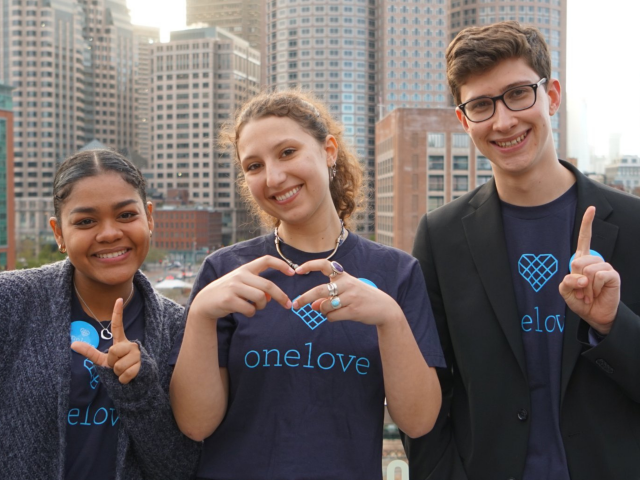“Locker room talk,” it’s a phrase we’ve heard a lot in the past few years. Typically it’s a phrase and behavior that is associated with men and stems from the idea that they naturally talk differently amongst themselves than they do in a mixed gender audience.
The truth is anyone can participate in locker room talk, which really just refers to exchanges people have in the company of like-minded or similarly gendered people due to it’s vulgar and often sexually charged nature.
But locker room talk is more than that.
Buried beneath this seemingly benign definition is the implication that this type of behavior is harmless and that words don’t really matter. And because words don’t matter, it gives people the freedom to say disparaging things about others consequence-free.
We’ve all experienced that sinking feeling we feel when a family member or classmate says something offensive and we aren’t sure how to react. Lots of questions may run through your mind. What happens next? Do you say something or let it be? If you’re anything like me, more often than not, you let it be. You become complicit. But deep down, we know something is off because locker room talk is not harmless. And it often normalizes a number of unhealthy behaviors that contribute to homophobia and relationship abuse.
Learning to identify when we’re being complicit in “small talk” that does not reflect our personal beliefs is the first step toward changing our behavior.
Letting it Be = Complicity
There are a number of reasons why people choose to be complicit in unhealthy “small talk” instead of speaking up. Usually, we don’t want to be complicit or silently approve of harmful behavior. It’s more complicated than that.
Maybe, the issue just doesn’t matter enough to us personally. Or maybe whatever was said seemed so small, it didn’t seem worth the time and effort to say something. I’ve totally been there. I tend to get so caught up in trying to figure out what to do that I end up going with the easiest thing, nothing.
Complicity: What it Looks Like
I’m often complicit in behavior that makes me uncomfortable. But, I’m trying to do better and I believe we all can too. Part of doing better is identifying the behaviors that make me complicit. The most obvious behavior is silence. But there are other ways we demonstrate complicity, such as
Dismissal: Dismissal refers to playing down the seriousness or severity of a situation. Example: “It’s not a big deal,” “It’s just a joke,” and “They didn’t actually mean what they said.”
Denial: Denial is the refusal to acknowledge facts or truths. Example: “That’s not what happened, they don’t really mean that.”
Deflection: Deflection is similar to dismissal in that it downplays the severity of a situation- but then it takes it a step further by diverting your attention. Example: “Eh, they just don’t get it.” “This is not as bad as (insert something “worse” here),” and “They’re a good person.”
Defensiveness: Defensiveness is a way to ward off a perceived attack and allows someone to avoid blame and/or responsibility. Example: “Not all (insert gender/race)!”
The biggest action you can take to push back against complicity is to speak up. We recognize that speaking up is a lot harder than it sounds so we’ve put together a few things you can do instead.
Trust Your Gut
For most of us, our immediate response to feeling uncomfortable is to push that feeling down as far as possible so we don’t have to think about it anymore. Some of us are so good at it, that we do it without realizing it.
The next time you have a gut reaction to something, try sitting with it for a moment. Ask yourself some basic questions: “What am I feeling right now?” “Why am I feeling it?”
Once you identify your feelings, trust it. You were triggered for a reason. Resisting the urge to immediately dismiss something that made you uncomfortable will eventually help you talk about what made you uncomfortable and why you were uncomfortable, the next time a similar situation arises.
Talk it Out
I have a secret for you: you are not alone in complicit behavior. If we really want to get technical, complicity requires the involvement of more than one person.
So if you let a moment pass where you realize you were complicit, talk about it with someone you trust. It can help you sort out your complicated feelings and begin to map out a way forward.
When you’re talking with your friend, try to identify:
- What made you complicit (e.g. Did you not say anything? Did you laugh it off?)
- Why didn’t you act? (e.g. Did you not want to cause trouble? Were you worried what everyone was going to think of you?)
- What action can you take the next time you’re in a similar situation (e.g. Is there something you’d like to say or do instead of what you did?)
Start Small
I tend to think that whatever action I take has to be big and grand and Wonder Woman-esque. I forget that in most situations, small acts can have a big impact.
The next time you hear something that makes you uncomfortable, try to gently bring attention to it. A simple “Hmm, I don’t know about that” type response can go a long way.
Another small but impactful step you can take to end harmful talk is to actually comment when you see a friend’s problematic post on social media. It doesn’t have to be divisive. In fact, I’ve found humor to be a super easy way to call out an unhealthy conversation without inciting rage until I can start a conversation offline. Try to take a friendly side-eye approach, e.g. “Really? Lol,” or using gifs and memes, such as:

We all have the potential to be unintentionally complicit in unhealthy behaviors when we let our fear of speaking up get the best of us. And that’s ok. Choosing to be non-complicit requires vulnerability, but if we all stay silent, nothing will ever progress. So start small and use the tips above to be the change.
For more information on how you can make a difference in the lives of those around you by starting a conversation about healthy and unhealthy behaviors, visit our Conversation Starters page.
Browse by Category

Don’t Be on the Naughty List: Spotting Unhealthy Relationship Signs This Holiday Season
The holidays are meant for joy, connection, and celebration—whether it’s Christmas, Hanukkah, Kwanzaa, or cozy winter vibes. But if someone…
How to Have Healthy Holiday Conversations with Family (and Prep Your Partner)
The holidays are a time for family, good food, and—let's…
3.2 Million Strong: How One Love is Saving Lives Through Education
Please share this blog with your network across social media,…
Finding Strength in Our Stories: Domestic Violence Awareness Month
⚠️ Trigger Warning: This blog includes content and language related…
Understanding Domestic Violence Awareness Month (DVAM)
October is almost here, and that means it’s time to…
















